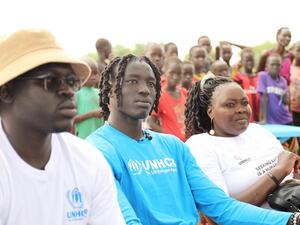UNHCR responds to massive displacement of Iraqis from Mosul
UNHCR responds to massive displacement of Iraqis from Mosul

Bushra (centre right) rests with her husband and family members in the shadow of a building in Iraq's Kurdistan region. They walked from their farm near Mosul to a checkpoint near the Kurdistan region's Erbil city. The family fled with almost no belongings.
ERBIL, Iraq, June 11 (UNHCR) - The UN refugee agency said today it was immediately stepping up its aid efforts in Iraq in response to the new massive displacement of people from the northern Iraqi city of Mosul and other areas.
UNHCR protection teams have been on the ground to monitor the outflow and assist those in need, and urgent additional funding is being sought. One protection officer said UNHCR was working to provide shelter, protection and emergency items, including tents to some of the many thousands of people believed to have fled from Iraq's second largest city.
"The needs are immense," said Gemma Woods. "While the numbers of those crossing from Ninewa governorate into Iraq's Kurdistan region today were visibly less than the long line of cars and pedestrians I witnessed yesterday, thousands continue to flee," she added.
The exodus from Mosul, which began earlier this week, follows massive displacement this year in the western Iraqi governorate of Anbar, where fighting since January has forced some half-a-million people to flee the province or seek shelter in safer areas. Local authorities say that as a result of the new outflows from Mosul a further 300,000 additional people have arrived in the past days.
Earlier on Wednesday, UNHCR protection staff monitoring checkpoints between Ninewa governorate and the Kurdistan region, reported that many of those fleeing had no belongings and lacked money for housing, food, water or medical care. They arrive at checkpoints with no idea of where to go next, or how to pay expenses.
UN agencies, humanitarian groups, and government officials are coordinating efforts to do what they can to aid those in need. UN agencies are making an emergency request for additional support for up to half a million additional people as a result of this crisis. Of that, UNHCR is hoping to provide emergency kits, including kitchen and hygiene items, as well as thousands of tents. UNHCR and its partners will also be working to protect and help the displaced.
The protection officer said the situation was less chaotic on Wednesday than Tuesday. "Yesterday it was a wave of humanity, a mass exodus, and those crossing were visibly panicked. They were packed into cars and buses under the harsh sun, and thousands were crossing on foot. Today, the numbers had lessened considerably, but the anxiety was still palpable," she said.
"One family stands out in my mind. There were 12 of them, including a 70 year old grandmother, who had travelled on foot for two days from their farm outside of Mosul. Once they reached the checkpoint, they had no inkling of what they might do next. They were out of money and had nowhere to go," the staff member said.
"These are the most vulnerable; and I saw and spoke with many in similar straits. They fled with the clothes on their backs, a bit of cash in their pockets, and nothing else. We must do all we can to provide shelter, food, water and medical care in the days ahead."








